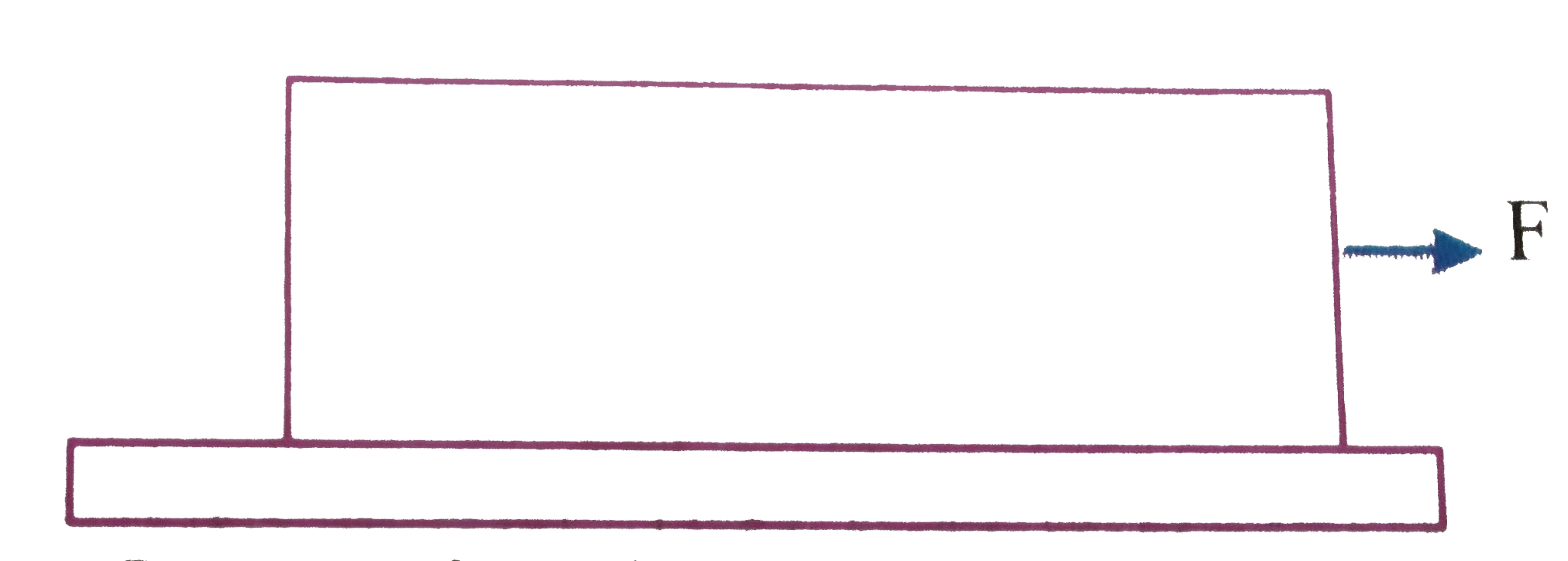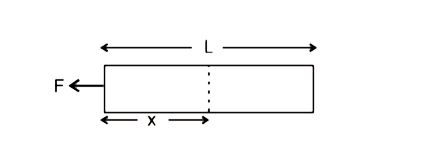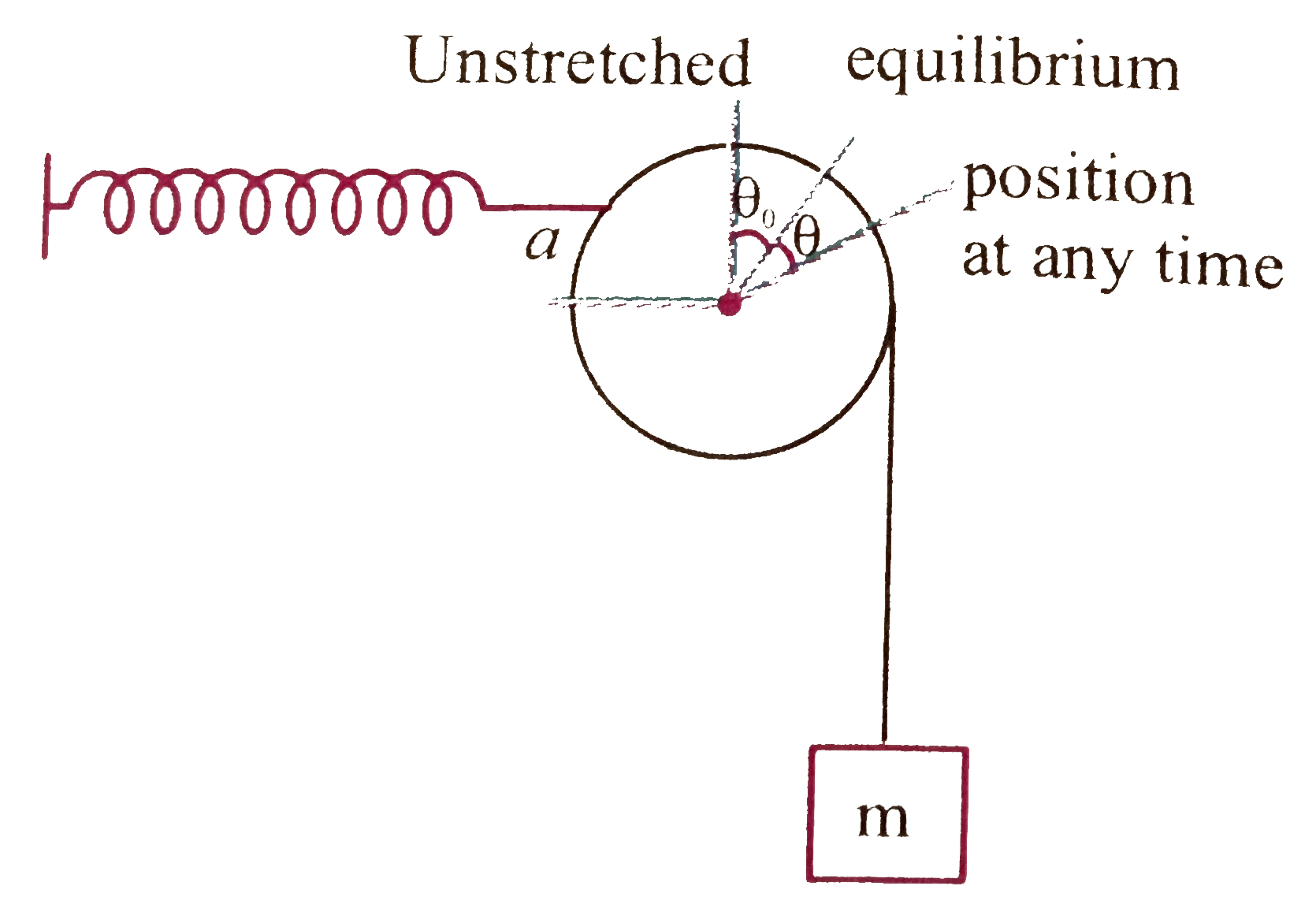A rod of length l, mass M, cross section area A is placed on a rough horizonatal surface. A horizonatal force F is applied to rod as shwon in figure. The coefficient of fricition between rod and surface is μ, the Young, modulus of material of rod is Y. [Assume that fricition force is distributed uniformly on rod]
![A rod of length l, mass M, cross section area A is placed on a rough horizonatal surface. A horizonatal force F is applied to rod as shwon in figure. The coefficient of fricition between rod and surface is mu, the Young, modulus of material of rod is Y. [Assume that fricition force is distributed uniformly on rod] The elongation in the rod if F lt mu Mg is](https://d10lpgp6xz60nq.cloudfront.net/physics_images/NAR_PHY_XI_V04_C02_E01_224_Q01.png)
The elongation in the rod if F<μMg is
Zero
⎡⎢⎣F−μMg22AY⎤⎥⎦l
Fl2AY
None
The correct Answer is:C
Then, F−T−f1=0&T=f2
where f1+f2=f=F
As friction force is distributed uniformly, f1=fxl
⇒T=F−f1=Ff×xl=F[1−xl]
Let Δ(dx) be the elongation in dx lenghth of rod
Δ(dx) be the elongation in dx lenghth of rod
Δ(dx)=TdxAy=F(1−xl)dxAY
Total elongation,
ΔL=∫Δ(dx)=∫10FAY(1−xl)dx=Fl2YA
Topper's Solved these Questions
- MECHANICAL PROPERTIES OF SOLIDSBOOK - NARAYNACHAPTER - MECHANICAL PROPERTIES OF SOLIDSEXERCISE - SINGLE ANSWER TYPE QUESTIONS
13 Videos
- MECHANICAL PROPERTIES OF SOLIDSBOOK - NARAYNACHAPTER - MECHANICAL PROPERTIES OF SOLIDSEXERCISE - Comprehension-1:
2 Videos
- MECHANICAL PROPERTIES OF SOLIDSBOOK - NARAYNACHAPTER - MECHANICAL PROPERTIES OF SOLIDSEXERCISE - MULTIPLE ANSWER TYPE
10 Videos
- MECHANICAL PROPERTIES OF FLUIDSBOOK - NARAYNACHAPTER - MECHANICAL PROPERTIES OF FLUIDSEXERCISE - EXERCISE - III
30 Videos
- MOTION IN A PLANEBOOK - NARAYNACHAPTER - MOTION IN A PLANEEXERCISE - Level-II(H.W)
31 Videos
Similar Questions
A uniform rod of length L and mass M has been placed on a rough horizontal surface. The horizontal force F applied on the rod is such that the rod is just in the state of rest. If the coefficient of friction varies according to the relation μ =Kx where K is a +ve constant. Then the tension at mid point of rod is?
View SolutionA uniform heavy rod of weight W, cross sectional area a and length L is hanging from fixed support. Young modulus of the material of the rod is Y. Neglect the lateral contraction. Find the elongation of the rod.
View Solution
Knowledge Check
A rod of length l, mass M, cross section area A is placed on a rough horizonatal surface. A horizonatal force F is applied to rod as shwon in figure. The coefficient of fricition between rod and surface is μ, the Young, modulus of material of rod is Y. [Assume that fricition force is distributed uniformly on rod]

Teh elongation in rod if F>μMg isA(F−μMg)l2AYB⎡⎢⎣F−μMg22AY⎤⎥⎦lCFl2AYDNoneA uniform rod of mass M and length L, area of cross section A is placed on a smooth horizontal surface. Forces acting on the rod are shown in the digram

Ratio of elongation in section PQ of rod and section QR of rod isA1:1B3:5C5:7D1:2A uniform rod of mass M and length L, area of cross section A is placed on a smooth horizontal surface. Forces acting on the rod are shown in the digram

Total elastic potential energy stored in the rod is :A7F2L6AYB11F2L6AYC5F2L6AYD3F2L2AY
A horizontal force is applied on a uniform rod of length L kept on a frictionless surface. Find the tension in rod at a distance 'x' from the end where force is applied

View SolutionA uniform rod of mass m and length l is on the smooth horizontal surface. When a constant force F is applied at one end of the rod for a small time t as shown in the figure. Find the angular velocity of the rod about its centre of mass.

View SolutionA uniform rod of mass M and length L, area of cross section A is placed on a smooth horizontal surface. Forces acting on the rod are shown in the digram

Ratio of elastic potential energy stored in section PQ and section QR of the rod is
View SolutionA uniform rod of mass M and length L lies flat on a frictionless horizantal surface. Two forces F and 2F are applied along the length of the rod as shown. The tension in the rod at point P is

View SolutionA uniform rod of mass m and length l is at rest on smooth horizontal surface. An impulse P is applied to end B as shown.

Distance travelled by the centre of the rod, while rod rotates by 90∘
View Solution
